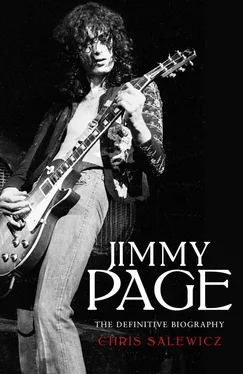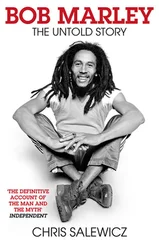The previous evening, Graham, who was promoting Day on the Green, as this event was billed, for an audience of 65,000, had been summoned to Led Zeppelin’s hotel, the San Francisco Hilton, to honour a sudden demand for a $25,000 cash advance against their fee for the shows. Entering their suite, Graham noticed a cowboy-hat-wearing local dealer of hard drugs; in a flash he realised what the money was needed for.
Arriving only 20 minutes before the start of the gig, Page was so evidently befuddled from his drug consumption, by that stage largely heroin, that Graham could only watch as the Led Zeppelin leader set off for the stage in entirely the wrong direction; he was rescued by an aide who stopped him and despatched him on the correct course. Midway through the set Bindon crawled out onto the stage on his hands and knees and licked Page’s boots.
As the wheezing, out-of-shape man-mountain that was Peter Grant lumbered up to the stage, Jim Downey, a member of the stage crew, commiserated with him about the excessively steep climb. For this presumption Bindon, who was accompanying Grant, punched Downey with such force that he slammed him into a concrete pillar and knocked him out.
‘What happened? The fuck did I do?’ wondered the victim as he came to. Downey was clearly unaware of an extraordinary management edict – egregiously pathetic in its arrogance – on what would become the final Led Zeppelin American tour: no one was permitted to speak to any member of the act, or to Grant, unless they were first spoken to. (Flying on the group’s plane, journalist Steven Rosen had been made fully aware of this. He was startled when the normally benign bass player, John Paul Jones, had verbally assaulted him, demanding all of his interview tapes – a response to an apparently unfavourable comparison of Zeppelin to the Jeff Beck Group that Rosen had made years previously. This incident was indicative of the prevailing mood on the tour.)
‘What I didn’t like about Led Zeppelin was that they came with force,’ Graham wrote later. ‘I had heard stories from other cities about how they had muscled promoters to get better deals. How they had shaken them down for money … I had heard about the ugliness of their security.’
But far worse was to come. Midway through Led Zeppelin’s show, during Page’s acoustic set, Matzorkis noticed a young boy removing wooden plaques from the doors of the dressing-room trailers: plaques that had the names of the artists on them, and which would be required for the repeat show the following day. Also on the bill, as support acts, were Judas Priest and Rick Derringer. Matzorkis told the kid to put them back. The kid was insistent that he would be taking them. So Matzorkis took them from him – allegedly cuffing him round the back of the head, although Matzorkis has always denied this – and wandered over to the storage trailer to lock them away. Unbeknown to Matzorkis, the boy was Warren Grant, the 11-year-old son of Peter Grant.
A few minutes later Matzorkis was still in the storage trailer when John Bonham, Led Zeppelin’s drummer – surplus to requirements during Page’s acoustic set – called to him from the bottom of the short flight of steps outside it. Peter Grant was with him.
‘You don’t talk to my kid that way,’ Grant said, as Matzorkis stood in the trailer’s doorway. The burly Bonham, an effigy of muscle and blubbery booze-fat, simply stood there, as though he was Grant’s security wingman. Then Grant escalated matters, like the barrack-room lawyer and bully he could be: ‘You don’t talk to my kid that way. Nobody does. I can have your job.’ Grant continued in this vein, accusing Matzorkis of ‘roughing this kid up. I heard you hit this child.’
Stepping up the stairs, Bonham then kicked Matzorkis between the legs, sending the stagehand flying back into the trailer. Bonham followed him in, while a pair of bodyguards endeavoured to restrain the drummer, shouting at Matzorkis to get out of there. He did, through a rear door.
When he learned of the incident, Graham went to find Grant in his trailer. For 20 minutes Graham put up a spirited defence of Matzorkis, yet Grant refused to budge from his thinking: ‘Your man put his hands on my people. On my son . How could you let this happen? How could you hire these people? I’m very disappointed in you.’
‘Let me speak to this man,’ Grant repeatedly demanded. When Grant finally insisted that all he wanted was to meet again with ‘the man’ who had caused these problems to ‘make my peace with him’, Graham somewhat reluctantly agreed to the manager’s request.
Walking over to find Matzorkis in another trailer, Graham observed that Grant was now flanked by a pair of other men; one of them was Bindon.
When Graham introduced Grant to Matzorkis, Led Zeppelin’s manager seized the stagehand, yanked him towards him and smashed him full in the face with a ring-covered fist, knocking him back into his seat. When Graham lunged at Grant, one of the security men picked up the promoter, threw him down the steps and shut the door of the trailer, standing guard in front of it.
Inside the trailer Bindon held Matzorkis from behind, while Grant started to work him over, punching him ceaselessly in the face, knocking out a tooth and kicking him in the balls.
Somehow, Matzorkis, who was screaming for help, broke free of Bindon. He managed to manoeuvre himself to the rear of the trailer, but this was when Bindon leapt upon him and went for his eyes. Fuelled by adrenaline, Matzorkis finally twisted away and got to the door.
Despite the security man guarding it, Matzorkis managed to get out of the trailer and run off across the backstage area.
Meanwhile, tour manager Richard Cole, armed with a chunk of metal pipe, had been attempting to enter the trailer. Bob Barsotti, who with his brother served as Bill Graham’s creative director, had prevented him, so he then turned on him. Realising that Cole was demented from the drugs he had seen him consuming during the day, Barsotti ran off, leading him on a merry dance down into the car park, where Cole ran out of steam.
By now several of Graham’s security men had gone to retrieve their ‘pieces’ from where they were stashed in their cars’ boots, but a seasoned member of the backstage crew reminded all concerned that the next day there would be another Led Zeppelin show: if the group did not play, 65,000 fans might very well riot. Yet the Graham crew consensus was that somehow the next day they would ‘deal’ with Zeppelin and their team. The promoter agreed with this thinking. He also made an offer: if they couldn’t ‘do’ Led Zeppelin and their cohorts the next day, then he would personally fly 25 of his men to New Orleans, the next date on the tour, and they could mete out revenge there.
At Graham’s home that evening, where the promoter had taken Matzorkis for protection following his release from hospital, he received a call from Led Zeppelin’s US lawyer: he demanded that Matzorkis sign an indemnity waiver, giving Led Zeppelin protection against being sued over what he referred to as a ‘minor altercation’. Unless this was received, Led Zeppelin ‘would find it difficult to play’ the next day.
Graham agreed to sign; his own lawyer told him that as he was acting under duress, it would not be legally binding. Besides, Graham had a plan. Knowing that Led Zeppelin would be staying in San Francisco for a further night following the Sunday show in Oakland, he had arranged with the local district attorney to arrest those culpable on the Monday morning.
At the Sunday concert the loathing of Graham’s entire crew towards Led Zeppelin was palpable: they glowered at the band and anyone connected with them. Page played most of the show seated, and he and Jones both looked bored. Robert Plant, however, sang very well indeed, dropping occasional words of commiseration in the direction of Graham; bootlegs indicate that it was a far better show than the previous day, partly because Led Zeppelin appeared drug-free. Still, it was a tense affair, and many in the audience were drunk and rowdy. Rumours were running round that a murder had been committed the previous day.
Читать дальше












